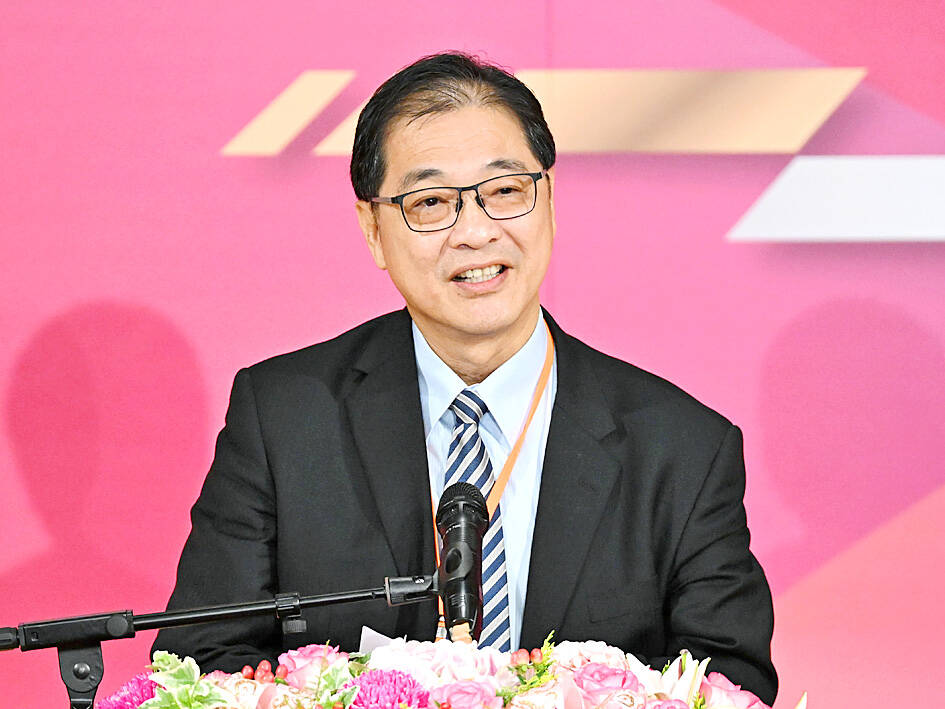The 37 prisoners on death row who have exhausted their appeals are to remain in prison, Minister of Justice Cheng Ming-chien (鄭銘謙) said on Tuesday in response to a question by Chinese Nationalist Party (KMT) Legislator Wu Tsung-hsien (吳宗憲) at the legislature in Taipei.
The 37 would remain in prison, as per the Prison Act (監獄行刑法), even though the Constitutional Court on Sept. 20 ruled that the death penalty could only be applied to “the most serious” premeditated murders or premeditated crimes resulting in death.
The ruling established a high threshold to significantly restrict the use of capital punishment in Taiwan.

Photo: Chen Yi-kuan,Taipei Times
Wu asked whether the death sentences of the 37 prisoners would be revoked, and if so, whether they would be released.
Cheng said the death sentences would not be changed and the prisoners would not be released, unless the Supreme Court reviewed their individual cases and decided to issue new rulings or send the cases back to a lower court for re-examination.
For the Supreme Court to even consider doing so, it would require the head prosecutor of the Supreme Prosecutors’ Office to file extraordinary appeals for those prisoners, he said.
The Supreme Prosecutors’ Office has said it would do so for two of the inmates — Chen Yi-lung (陳憶隆) and Huang Chun-chi (黃春棋) — because the rulings underlying their death sentences were ruled unconstitutional by the Constitutional Court on Sept. 20.
The two, convicted of kidnapping and murdering a businessman surnamed Huang (黃) in 1995, were sentenced to death based on an already defunct Criminal Code provision for a “mandatory death penalty.”
As for the remaining 35 prisoners — all of whom have been sentenced to death for homicide and most of whom have been in prison for more than a decade — the Supreme Prosecutors’ Office said it would examine each case before determining its next step.
Cheng said that the prisoners would only be released if a court later ruled that they were not guilty.
“We must have confidence in the courts,” Cheng said, adding that a release scenario was unlikely.
Wu, who is a prosecutor-turned-lawmaker, asked Cheng whether time spent behind bars would be counted as time served if their penalties were changed to fixed-term sentences.
Cheng ruled out such a possibility, citing the Criminal Code.
The KMT legislative caucus has criticized the ruling by the Constitutional Court as abolishing the death penalty in all but name.
The caucus held a news conference on Tuesday in a bid to pressure the Ministry of Justice into carrying out the sentences of the 37 prisoners on death row.

Alain Robert, known as the "French Spider-Man," praised Alex Honnold as exceptionally well-prepared after the US climber completed a free solo ascent of Taipei 101 yesterday. Robert said Honnold's ascent of the 508m-tall skyscraper in just more than one-and-a-half hours without using safety ropes or equipment was a remarkable achievement. "This is my life," he said in an interview conducted in French, adding that he liked the feeling of being "on the edge of danger." The 63-year-old Frenchman climbed Taipei 101 using ropes in December 2004, taking about four hours to reach the top. On a one-to-10 scale of difficulty, Robert said Taipei 101

Nipah virus infection is to be officially listed as a category 5 notifiable infectious disease in Taiwan in March, while clinical treatment guidelines are being formulated, the Centers for Disease Control (CDC) said yesterday. With Nipah infections being reported in other countries and considering its relatively high fatality rate, the centers on Jan. 16 announced that it would be listed as a notifiable infectious disease to bolster the nation’s systematic early warning system and increase public awareness, the CDC said. Bangladesh reported four fatal cases last year in separate districts, with three linked to raw date palm sap consumption, CDC Epidemic Intelligence

Two Taiwanese prosecutors were questioned by Chinese security personnel at their hotel during a trip to China’s Henan Province this month, the Mainland Affairs Council (MAC) said yesterday. The officers had personal information on the prosecutors, including “when they were assigned to their posts, their work locations and job titles,” MAC Deputy Minister and spokesman Liang Wen-chieh (梁文傑) said. On top of asking about their agencies and positions, the officers also questioned the prosecutors about the Cross-Strait Joint Crime-Fighting and Judicial Mutual Assistance Agreement, a pact that serves as the framework for Taiwan-China cooperation on combating crime and providing judicial assistance, Liang

US climber Alex Honnold left Taiwan this morning a day after completing a free-solo ascent of Taipei 101, a feat that drew cheers from onlookers and gained widespread international attention. Honnold yesterday scaled the 101-story skyscraper without a rope or safety harness. The climb — the highest urban free-solo ascent ever attempted — took just more than 90 minutes and was streamed live on Netflix. It was covered by major international news outlets including CNN, the New York Times, the Guardian and the Wall Street Journal. As Honnold prepared to leave Taiwan today, he attracted a crowd when he and his wife, Sanni,